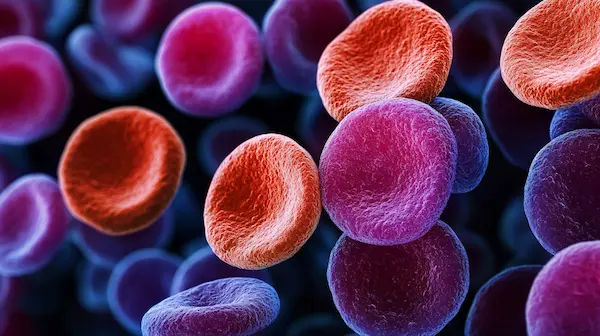Unexplained Bruising in Grandmothers? Platelet Count Test for Elderly Women
Discover why unexplained bruising in elderly women, especially grandmothers, could signal low platelets. Learn when to seek a platelet count test and what steps to take next.

Written by Dr. Rohinipriyanka Pondugula
Reviewed by Dr. Siri Nallapu MBBS
Last updated on 8th Aug, 2025

Noticing bruises that you can't remember getting can be a common experience as you age. While often harmless, unexplained bruises in elderly individuals can sometimes signal an underlying health issue, such as a change in the blood's ability to clot. This is where a platelet count test becomes a valuable diagnostic tool for seniors and their caregivers.
This article provides an overview of why unexplained bruising occurs in older adults, the function of platelets, and how a simple blood test can provide important information about your health.
Why Do We See Unexplained Bruising in the Elderly?
Bruising in older adults is certainly common. As we age, our skin becomes thinner, losing the protective fatty layer beneath it. This makes the small blood vessels just under the skin more fragile and easier to break. Certain medications, like blood thinners or even some over-the-counter pain relievers, can also increase the risk of bruising.
Occasional bruises are common, especially in older adults. But if your grandmother starts developing frequent, unusually large bruises, or if they appear without any clear injury, it could be a sign of something deeper. One of the most common causes is a low platelet count. This isn’t something to brush off; it’s important to speak with her doctor and get the right tests done to understand what’s going on.
The Role of Platelets in Blood Clotting
Platelets, also known as thrombocytes, are tiny, disc-shaped cells produced in the bone marrow that are crucial for stopping bleeding. A normal platelet count ranges from 150,000 to 450,000 per microliter of blood. If the count drops below this range, it’s called thrombocytopenia.
The process of forming a blood clot to stop bleeding is called hemostasis, and it involves several steps:
- Platelet adhesion and activation: When a blood vessel is damaged, platelets recognise the injury and stick to the vessel wall. They change shape and become activated, releasing signals that attract more platelets.
- Platelet aggregation: Activated platelets clump together at the injury site, forming a soft plug that temporarily seals the wound.
- Fibrin reinforcement: At the same time, clotting proteins in the blood trigger a reaction that creates fibrin, a strong protein that forms a mesh over the platelet plug. This stabilises the clot and allows healing to begin.
- When the platelet count is low, the body struggles to form this initial plug, making it easier for bleeding to occur and for even minor impacts to result in visible bruising.
When to Be Concerned: Signs Beyond a Simple Bruise
A few extra bruises here and there might be nothing to worry about. But there are specific signs that could indicate a more serious problem and should prompt you to call a doctor right away:
- Petechiae (Pinpoint Spots): Tiny, flat, red or purple spots on the skin that do not turn white when pressed. They indicate bleeding from small blood vessels.
- Purpura (Larger Blotches): Reddish-purple spots or patches on the skin that look like bruises but appear without injury.
- Prolonged or Uncontrolled Bleeding: A small cut that bleeds for an unusually long time. This also includes frequent nosebleeds or bleeding from the gums.
- Blood in Bodily Fluids: Any visible blood in urine (pink or red) or stool (black or tarry). This is a serious symptom that needs immediate medical attention.
- Severe Headaches: In rare cases of extremely low platelet counts, bleeding can occur in the brain. A sudden, severe headache, confusion, or vision changes requires immediate emergency care.
These symptoms, especially when they occur together or worsen over time, are not a normal part of aging and should be discussed with a doctor without delay.
The Crucial Role of a Platelet Count Test for Seniors
The good news is that diagnosing a low platelet count is simple. It's a quick, standard blood test, usually part of a Complete Blood Count (CBC). This test is invaluable for getting a clear picture of what's happening inside your body.
A platelet count test seniors often need will:
- Confirm a low count: It accurately measures the number of platelets in your blood.
- Guide treatment: The test results help her doctor determine the cause of the low count and what the best course of action is.
Provide peace of mind: Knowing the cause of the bruising (whether it's a simple case of thin skin or something more) helps families make informed decisions and reduces unnecessary worry.
What to Expect During a Platelet Count Test?
If your grandmother’s doctor recommends a platelet count test, there’s no need to worry. It’s a routine and straightforward procedure that helps check for possible causes of unexplained bruising.
Here’s what typically happens:
- No special preparation is needed. She can eat and drink normally before the test unless the doctor advises otherwise.
- A small amount of blood is drawn from a vein in her arm, just like any regular blood test.
- The process takes only a few minutes and causes minimal discomfort. She may feel a quick pinch when the needle goes in.
- The blood sample is sent to a lab for analysis. Results are usually available within one to two days.
- Once the results are ready, her doctor will review them along with her symptoms and medical history to decide on the next steps.
This test is a simple way to check if low platelet levels could be contributing to bruising, and it helps guide the right treatment if needed.
What to Do If Your Grandmother Has Low Platelets?
If your grandmother’s platelet count is low, the most important step is to follow her doctor’s guidance closely.
Here’s what you can do:
- Follow the treatment plan: Her doctor will identify the cause and recommend specific steps, which may include medications, monitoring, or lifestyle changes. Stick to the plan exactly as prescribed.
- Review her medications: Some common drugs, like aspirin or ibuprofen, can affect platelet function. Her doctor may adjust these or suggest safer alternatives.
- Prevent injuries: Help her avoid falls and bumps by ensuring safe flooring, using supportive footwear, and limiting high-risk activities. Even minor injuries can lead to bleeding when platelets are low.
- Watch for symptoms: Be alert for signs like frequent nosebleeds, bleeding gums, or small red spots on the skin (petechiae). Report any new or worsening symptoms to her doctor right away.
- Supporting her with care, attention, and regular communication with her doctor can make a meaningful difference in her recovery and safety.
Platelet Count Testing with Apollo 24|7
When it's time to get a platelet count test seniors need, services like Apollo 24|7 can make the process convenient and stress-free. With home sample collection, digital reports, and easy doctor consultations, the entire process is designed for comfort and convenience.
Apollo 24|7 makes the testing process simple and safe:
- Easy online booking for the platelet count test (usually part of a CBC) through their website or app.
- Convenient home sample collection, so your grandmother can be tested comfortably at home, without needing to visit a clinic.
- Fast and reliable digital results, leading to quicker diagnosis and faster medical action.
- NABL-accredited laboratories, ensuring high-quality and trustworthy testing standards.
- Access to doctor consultations, allowing you to discuss test results and get the right treatment advice.
Get Your Health Assessed Here
Conclusion
Seeing unexplained bruises in elderly family members or your grandmother can be unsettling. While it's true that some bruising is a natural part of ageing, it's also true that being proactive about your health is one of the best things you can do. A simple platelet count test seniors can take is the first step toward understanding the cause and ensuring they receive the care they need. Don't wait, talk to her doctor about her concerns and ask if a platelet count test is right for her.



